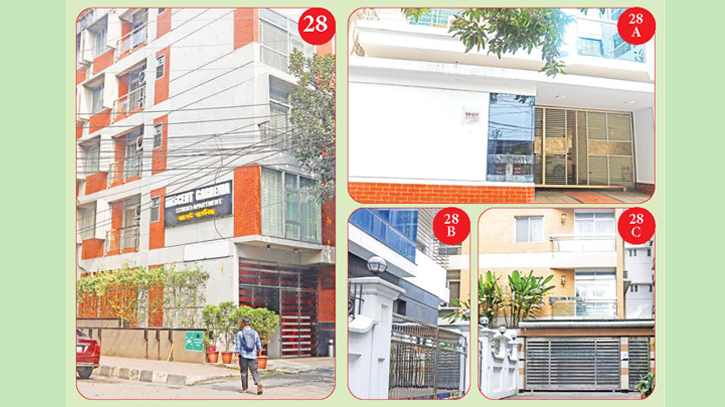
Photo : Messenger
In the upscale Gulshan-2 area of Dhaka, a deeply concerning situation has emerged as an expansive 48.60 decimal of government-owned land has reportedly been acquired by four individuals thanks to abuse of power by two Rajdhani Unnayan Kartripakha (RAJUK) officials – with an apparent case of dillydally holding back charge framing against the accused.
The Anti-Corruption Commission (ACC) investigation has unearthed compelling evidence, revealing that the two RAJUK officials abused their authority by allocating an abandoned property in the name of an individual. It has come to light that RAJUK did not possess the legal mandate to make such allocations, leading to a covert handling of the entire allocation process.
It was known that the individuals have not only have encroached upon this significant property, but they have also gone on to erect four multi-storied buildings on the unlawfully acquired land. The recorded deed value of these properties reflects a substantial loss to the government, totaling Tk 89 crore 25 lakhs. However, the current market value of these constructed properties far exceeds several hundred crores.
Adding to the gravity of the situation is the involvement of a former chairman and a director of the Rajdhani Unnayan Kartripakkha (RAJUK) in this fraudulent activity.
Following a meticulous investigation, ACC Deputy Director Salina Akhtar took a significant step by submitting the charge sheet to the court on January 24, 2022. Subsequently, on May 10 of the same year, the Senior Special Judge Court of Dhaka City duly acknowledged the charge sheet, marking a crucial development in the legal proceedings against the accused individuals.
This judicial acknowledgment underscores the severity of the charges and sets the stage for a comprehensive legal process to unfold, emphasizing the commitment to holding those involved accountable for their actions. The recognition by the court signals a pivotal moment in the pursuit of justice, ensuring that the legal system thoroughly addresses the alleged misconduct and irregularities surrounding the acquisition and development of the government-owned land.
On January 29, 2018, Deputy Director Salina Akhtar took a decisive step by initiating legal action against eight individuals, including the former chairman of RAJUK, Humayun Khadem. The case, filed at the Motijheel police station, implicates other key figures such as former RAJUK director Abdur Rahman Bhuiyan (AR Bhuiyan), Amir Hossain Dewan (the plot recipient), AKM Sahiuzzaman, Sahiuzzaman's wife Kamrun Nesa, Md Mosharraf Hossain, Md Zakaria Chowdhury, and Moshiar Rahman—all of whom are mentioned in the charge sheet.
In a significant development, Humayun Khadem surrendered to the court on May 16, 2023, and subsequently secured bail until June 4. The bail was granted by Judge Iqbal Hossain of Dhaka's Special Judge Court No. 5.
Initially scheduled for July 13, 2023, the framing of the case in the Fifth Special Judge Court of Dhaka faced a rescheduling when the Anti-Corruption Commission (ACC) requested additional time. Judge Iqbal Hossain granted the extension, pushing the hearing to August 13. Further, in November, another hearing was specifically slated for framing the charges against the accused parties.
This ongoing legal process signifies a crucial step towards addressing the alleged misconduct in the land acquisition and construction scandal, underscoring the commitment to accountability and justice in the face of corruption allegations involving prominent figures from RAJUK and other individuals.
According to sources from the ACC, the delay in framing the charges is impeding the commencement of the trial. ACC lawyer PP Rafiqul Islam Jewel, in response to inquiries, stated to The Daily Messenger that the order to frame charges is anticipated to take place in the month of January.
In response to the delays in framing charges in the case involving RAJUK officials, former Director General (Legal and Prosecution) of the ACC, Moyeedul Islam, expressed concern, stating to The Daily Messenger that the process should not take an extended period, attributing the delays to procrastination rather than a legitimate need for time. He emphasised that the charges should be framed either upon the court's acceptance of the charge sheet or the discharge of the accused. Additionally, he highlighted that there is no established rule for the
ACC to apply for extensions, suggesting that such requests could indicate a lack of a stay from the High Court, thereby contributing to trial delays.
The charge sheet itself alleges that the disputed land NEG-6 remains under the jurisdiction of the Department of Housing and Public Works or has not been released to the state as per the 1985 order. According to the 1985 order, the Department of Housing and Public Works is responsible for managing government abandoned properties. RAJUK officials are accused of withholding crucial details about the original document concerning the NEG-6 land and its abandoned property, despite lacking the jurisdiction to do so.
When questioned about why no one from the Housing and Public Works Department was included in the charge sheet, ACC lawyer PP Rafiqul Islam Jewel responded that an explanation from the ACC official could shed light on this matter. However, Deputy Director Salina Akhtar refrained from providing any comment on the issue.
The charge sheet alleges that during the allotment of plots to the accused Humayun Khadem on June 14, 1993, the plots in question did not physically exist on Road No. 83.
Subsequently, on December 15, 1993, Town Planner Zakir Hossain drew the four plots. It is claimed that as plot No. NEG-6 is designated as an abandoned property, the RAJUK Chairman lacked the authority to allocate it. Therefore, a new plot was purportedly created using the holding number. Notably, in RAJUK's Khatian (land record), the disputed NEG-6 plot still bears the name of People's Jute Mill.
The historical background provided sheds light on the intricate series of land allotments for the plot in question, NEG Plot No. 6, located on Road No. 83 in Dhaka's Gulshan Model Town (now Gulshan-2). On February 22, 1965, the 48.60 decimal plot was initially leased to People's Jute Mill by the then Dhaka Improvement Trust (DIT). This mill, owned by Prince Karim Aga Khan, was situated in Khalishpur, Khulna. Prior to the allocation to People's Jute Mill, the plot had been allotted in the name of Commander Zahidi. Following the cancellation of Zahidi's allotment, RAJUK allotted the plot to People's Jute Mill, with the records consistently reflecting the names of Zahidi and People's Jute Mills in the land office documents.
However, in 1992, RAJUK expedited the process of allocating new names to four individuals without nullifying the existing records. This move was accompanied by the disappearance of the original land office documents. Presently, the plots are identified by holding numbers 28, 28(A), 28(B), and 28(C).
The revelation that the property was declared abandoned in 1972 by a presidential order, thereby making the government the rightful owner, adds a significant dimension to the case. Despite the government's ownership, the subsequent illegal allotment of the plots to individuals—specifically, Amir Hossain Dewan, Mosharraf Hossain, Zakaria Chowdhury, and Moshiur Rahman—raises serious concerns.
It is noted that Zakaria Chowdhury and Moshiur Rahman are currently in possession of the plot, while the ownership of the other two plots appears to have been shuffled.
The information provided reveals a series of concerning actions by RAJUK authorities involving the concealment of plot allotment documents and the subsequent division of the original plot number NEG-6. It appears that, in an attempt to change the identity of the plot, the authorities swiftly took control of the land and allocated it to the defendants, dividing it into four parts with the holding number of the City Corporation.
The deliberate deletion of all traces of plot number NEG-6 raises questions about the transparency and legality of the process undertaken by RAJUK. The fact that the defendants completed the registry deed of the plot before realising its ownership by a state-owned corporation, as highlighted by the counsel for People's Jute Mills, further complicates the situation.
Moreover, it is mentioned that AKM Sahiuzzaman and his wife Kamrun acquired their share from accused Amir Hussain Dewan at a later stage. The involvement of various individuals in these transactions adds layers of complexity to the case.
The information provided indicates a deliberate and unlawful acquisition of the plot by Amir Hossain Dewan, Md. Mosharraf Hossain, Md. Zakaria Chowdhury, and Moshiar Rahman.
These individuals were aware that the property was an abandoned one, yet they bypassed any legitimate processes such as lotteries or auctions. Instead, they sought to obtain the plot by applying directly to RAJUK authorities, resulting in the illegal allocation of state-owned properties in their names.
The fact that the ACC initiated the investigation in 2014, with changes in officers and recommendations at some point for the inquiry to be terminated. The subsequent reassignment of Deputy Director Selina Akhtar to re-investigate the complaint suggests a renewed effort by the ACC to address the irregularities and bring those involved to justice.
Messenger/Disha








